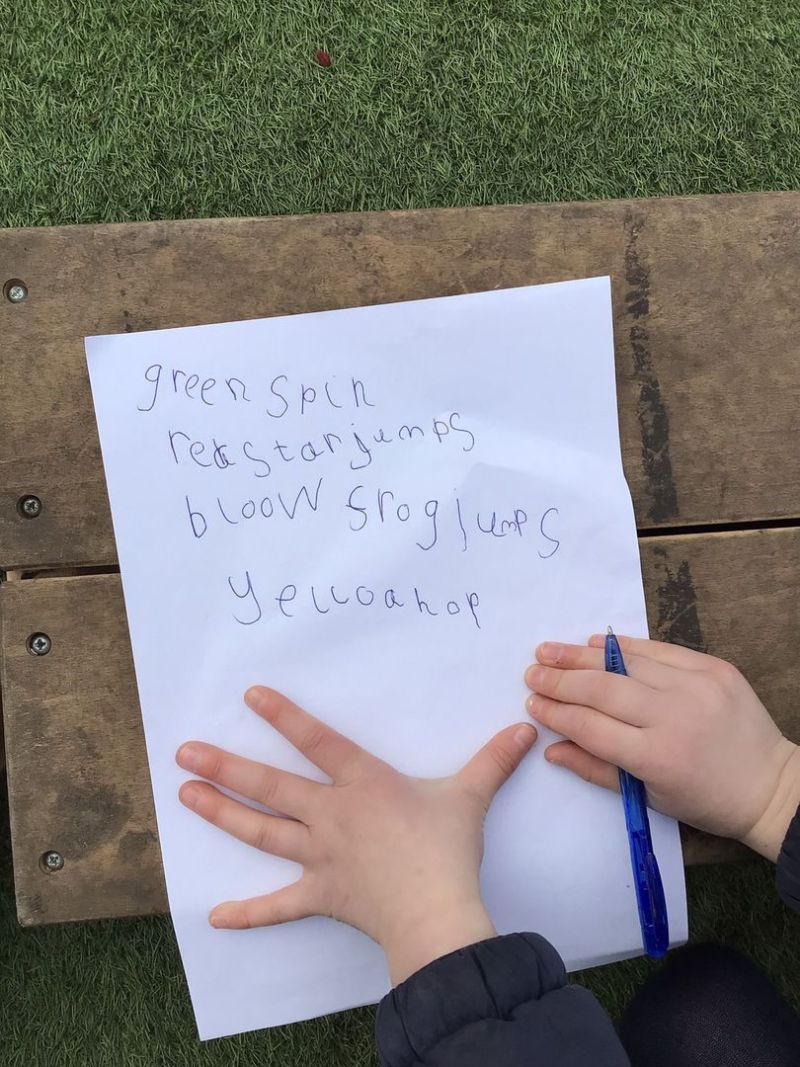
Phonics, Spelling and Handwriting
Our Intent
At Kirkby on Bain CE Primary School, we know that all children deserve to be readers. We believe that reading is the most important skill for our children; enabling them to access and understand the rest of the curriculum. As a school, we are dedicated to encouraging children to read for pleasure and relaxation, doing so with confidence. ‘Being’ a reader is beneficial as a learner and for well-being. We strive to reach our core intention: to ensure children become fluent, confident, and independent readers as quickly as possible.
We truly believe that by inspiring children to read, being read to and by giving children opportunities to explore a range of rich and appropriately challenging texts in all areas of the curriculum, this will inspire them to succeed.
Aims:
• To have consistent practice, progression and continuity in the teaching and learning of phonics throughout the school with a focus on quality first teaching.
• To ensure that the teaching of phonics is consistent and centred around the rehearsal of application.
• To provide a language rich environment that encourages and develops their articulation, language and expression starting from their first day and continuing throughout the school.
• For children to learn to read and write all 44 phonemes in the English language and the variety of ways to spell them.
• To ensure that systematic synthetic phonics is the first approach pupils use to help with their reading and spelling. To have robust assessment procedures to check progress and identify pupils in need of intervention.
• For children to apply their phonic knowledge in their reading and writing in both child-led and adult-led endeavours.
• To ensure children are explicitly taught how to identify common exception words.
• For pupils to develop a love of reading and enjoy reading for pleasure, confidently across a range of genres for a variety of reasons.
• To develop a good understanding of texts they are reading (comprehension) and to read aloud with fluency and prosody.
Implementation
To achieve our intent, we have developed our own Systematic, Synthetic Phonics Programme. We have created a programme to ensure that children experience a consistent, rigorous, and challenging start to their journey in learning to read and write.
Daily Phonics Lessons:
We have a 20 – 30 minute teaching session per day in Reception, Years One and Two alongside phonics application in all areas of our continuous provision and teaching interactions throughout the day. Where needed, small group interventions (‘keep up’ and/or ‘catch up) are carefully planned and delivered by our English Lead, class teachers and teaching assistants.
Our lessons are well-planned for the cohort and follow the same cycle throughout EYs and KS1.
Revise and Rehearse– recap of previous phonemes and rehearsal of application to reading and writing.
Learn and Apply – teach a new sound and practise using it.
Reading Rehearsal – provide opportunities to identify the new sound linking it to previous spelling choices (if appropriate) and rehearsal of reading the new sound within words.
Writing Rehearsal – apply the new phoneme/ word to writing words, captions and sentences. (Rehearsing our strategy ‘asking the question’.)
Challenge: Teaching of CEW’s and apply this to reading or writing also incorporating the phoneme from that day.
The fast paced, structured lessons ensure children receive clear, direct teaching with opportunities to practise and apply. All phonic resources are consistent across the school so children can use them confidently to reinforce their learning, including sound mats, flashcards, actions, handwriting rhymes, CEW prompts.
Our SSP programme has been written to ensure that KS2 build on the learning from KS1. This ensures that prior learning is valued, all teachers are experts in our phonics programme and children’s understanding of phonics is deepened/embedded. Our spelling lessons in KS2 link to prior phonics learning in KS1 and follow a similar lesson structure.
Revise and Rehearse: Recapping on prior learning of spelling rules and different spelling choices for phonemes.
Learn and Apply – teach a new spelling rule or pattern and practise identifying/ using it.
Writing Rehearsal – apply the new spelling pattern/rule when writing words, captions and sentences. Identify errors, editing, discussing and exploring the learning.
Vocabulary: Explicitly teaching vocabulary linked to spelling rule/pattern including Statutory Spellings for year group.
Challenge: Applying the learning in a challenging way.
Progression
Our sequence of progression ensures that teachers have high expectations for coverage. Quality teaching means that the scheme is rigorous and challenging. We embed GPC knowledge whilst teaching children how to apply this to independent reading and writing. Rehearsing the application of known GPC’s is at the core of our teaching sessions ensuring that all children make progress in every session.
Consistency Training
We pride ourselves on providing regular CPD for all staff members to ensure that we are committed to our SSP Programme and are delivering phonics teaching in a consistent way. Phonics training is provided for all new parents and supportive documents have been produced for parents to use with the children. We believe that consistency should be threaded throughout home and school. When a school place is accepted, during the summer term before the children start school, we invite all parents and carers into school for their first training session.
Spelling:
When phase 5 is completed and children are applying this, the children are taught spelling patterns and rules. We are passionate about the children learning these aspects at school. We have developed Spelling Rules Charts for each year group, linking the NC spelling requirements to our SSP Programme. In KS2, the children have rigorous spelling lessons about spelling rules and are then given sample wordlists to rehearse the rules at home. CEW’s are explicitly taught at school. We focus on the statutory spelling word lists for each year group and they are taught using our SSP Programme to ensure consistency and commitment to our scheme.
Language:
We ensure that all staff use the same vocabulary and encourage the children to use it too. We know that a consistent, daily, well-paced phonics/spelling session is essential for the development of every child to ensure that ALL children are readers and can write confidently.
Handwriting:
We have high expectations for children’s handwriting and try to instil a sense of pride in the children in the presentation of their work. We have linked the teaching of handwriting to our phonics scheme by writing a letter formation rhyme/story to help children form their letters correctly. Once the children are developmentally/physically ready, we introduce the cursive writing to aid joined handwriting (usually in Y2). Children are encouraged to use a pen in year 3/4 once they have a clear, well-joined handwriting style. In year 5 and 6, we allow children to make a choice of their writing implement. Some children feel they write neater in pen whilst others prefer a pencil.
Vocabulary:
We ensure that our children are exposed to a broad and rich vocabulary via the language staff use, the texts shared, and the explicit vocabulary taught each week. Teaching a variety of tier two words allows the children to constantly build their language for both speaking and writing. Parents are also encouraged to use rich language with their children even before they start attending our school.
Impact
Assessment:
We assess the children’s GPC knowledge and how they apply this knowledge to reading, writing and spelling. We are committed to identifying those at risk of falling behind and work hard to ensure that they are highlighted and supported at the earliest possible opportunity. Where possible, we aim to keep the cohort together when teaching phonics to ensure that all children are exposed to all elements and there are high expectations for all children. For those children who need interventions, this is in addition to their daily phonics lesson in the form of a ‘keep-up’ or ‘catch-up’ session depending on the need of the individual children.
Formative assessment occurs in daily phonics sessions and children are given appropriate challenge at the correct level.
Summative assessments using the school’s phonics assessments are carried out termly and these are used to inform planning and raise any concerns with senior leaders.
Baseline tests are carried out in each year group and Phonics Screening practise tests occur at the end of the Autumn term in Year 1 and again at the end of Spring 2. The results of these are discussed at regular Pupil Progress meetings.
When completing a Phonics Screening Practise test children apply their decoding skills to any unfamiliar word whether it is real or nonsense. Children practice their decoding skills by sounding out the letters in ‘alien words/nonsense words’. This gives children the opportunity to use their grapheme-phoneme knowledge as they are unable to rely on existing knowledge of real words.
Our Phonics Assessments are used as a baseline in Year Two to check gaps after the six weeks holiday and further tests are completed at the beginning of the second half term in Autumn. These results again help inform planning and intervention support.
A bi-weekly 'Curriculm Chat' and regular Pupil Progress meetings between the class teacher and the SLT flags up any children who may be falling behind or children who may need extra challenge and the impact of strategies/extra support put in place is monitored. The impact of any extra support is discussed with the English Lead the teacher monitors progress of the whole class, each term. Assessment data is monitored by SLT and the English Lead who is also the KS1 Lead.
Inclusion:
All children have equal access to the curriculum as expressed in our Equal Opportunities Policy. We will ensure that phonics is accessible to pupils by:
• Setting suitable learning objectives and differentiated expectations.
• Responding to the variety of learning styles
• Overcoming potential barriers of individuals and groups
This is monitored by analysing pupil performance throughout the school to ensure that there is no disparity between groups.
Phonics Screening
The Year 1 phonics screening check is a short, simple assessment to confirm whether individual pupils have learnt phonic decoding to an appropriate standard. The screening usually takes place in the Summer Term of Year 1 and is completed by all schools nationally. This check is carried out during which the children will be assessed on their ability to segment and blend a range of 40 real and ‘alien’ words. Alien words are a selection of phonetically decodable nonsense words.
All children in year 1 must take the check, unless they have no understanding of grapheme-phoneme correspondences.
The check identifies the children who need extra help so they are given support by the school to improve their reading skills. If a child has not reached the required standard and not passed the check, then they will retake the check in the Summer Term of Year 2 and throughout Year 2 these pupils will have extra intervention to help them reach the required standard.
Intervention:
Whilst every effort is made to ensure children do not ‘fall behind,’ we know that some children will not completely absorb and retain the phonemes and spelling rules immediately. For children whom we feel need to repeat certain aspects, we assess thoroughly and plan either small group/ 1:1 interventions to enable the children to relearn and rehearse. This is monitored by the class teachers, SENco and English Lead. Other interventions are carefully planned and delivered to support children further. We have created interventions such as A2W for children not applying their GPC knowledge to reading and/or writing. All interventions, including the ‘Catch-up Reader’ Programme are linked explicitly to our SSP Programme.
There are no news articles at present.



